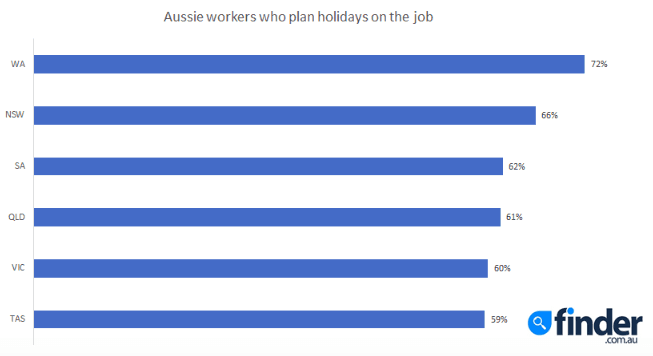- Bessie Hassan
- Head of PR & Money Expert
- finder.com.au
- +61 402 567 568
- Bessie.Hassan@finder.com.au
Media Release
Aussie workers spend 7.6M hours a week holiday-planning on the job
- Holiday distractions costs businesses $14.6 billion in lost productivity
- Gen X least likely to slack off booking holidays
- How to get the best travel deal
24 May 2018, Sydney, Australia – Millions of Australian employees are researching and booking their next holiday when they should be working according to a new study by finder.com.au, the site that compares virtually everything.
The research reveals two in three Australian workers (64%) – equivalent to 8 million people – actively plan their next escape on the boss’ time.
It shows the average Aussie employee spends 57 minutes a week hunting for cheap flights and hotels, which equates to cumulative total of 7.6 million hours wasted every week.
This lost productivity is costing Aussie businesses $280.8 million in wages every single week, or $14.6 billion annually.
Angus Kidman, travel expert and editor-in-chief at finder.com.au, is surprised at how many Aussies are perusing holidays when they should be working.
“It’s one thing to be jumping on that flight sale during your lunch break, but it’s quite another to be regularly planning holidays during work hours.”
“We live in an age where we’re surrounded by distractions: emails about sales are constantly flooding our inboxes and social media. While you need to be quick to get in, there’s a time and place to be acting on them.”
Male employees are more guilty of holiday distraction with 67% admitting to organising travel at work compared to 61% of female workers.
Men use 64 minutes a week dipping into work time to plan a holiday in comparison to 50 minutes for women.
Tasmania is the most productive state with 59% of workers stating they plan holidays while at work. This compares to just 72% of those from Western Australia and 66% in NSW.
“Domestic flights from Western Australia can be very expensive, so this might explain why residents spend more time looking for deals on the job.”
Gen X is the most responsible when it comes to abstaining from arranging travel plans at work. Only 57% of Gen X workers admit they do it, versus 70% of Gen Ys and 60% of Baby Boomers.

How to get the best travel deal
- Go where the sales are
You might have a specific destination list in mind, but chances are, those places are on everyone else’s lists too.
Like eating fruit and vegetables that are in season, choosing destinations that have the best sales will save you money.
- Set sale alerts for the routes you’re considering
Several online travel agents have price alert features. Enter the route you’re after and it’ll notify you when the price drops.
- Be flexible with dates
The more flexible you can be with dates, the more you can book travel when the price suits you. This is less feasible if you have children in school so instead try and travel to destinations that aren’t in peak season to score a better deal.
- Do your research
Compare a few websites and prices before you book. If you prefer to book via a travel agent, take advantage of price-match guarantees, do your research online and ask them to match it.
###
For further information
- Bessie Hassan
- Head of PR & Money Expert
- finder.com.au
- +61 402 567 568
- Bessie.Hassan@finder.com.au
Disclaimer
The information in this release is accurate as of the date published, but rates, fees and other product features may have changed. Please see updated product information on finder.com.au's review pages for the current correct values.
About Finder
Every month 2.6 million unique visitors turn to Finder to save money and time, and to make important life choices. We compare virtually everything from credit cards, phone plans, health insurance, travel deals and much more.
Our free service is 100% independently-owned by three Australians: Fred Schebesta, Frank Restuccia and Jeremy Cabral. Since launching in 2006, Finder has helped Aussies find what they need from 1,800+ brands across 100+ categories.
We continue to expand and launch around the globe, and now have offices in Australia, the United States, the United Kingdom, Canada, Poland and the Philippines. For further information visit www.finder.com.au.
12.6 million average unique monthly audience (June- September 2019), Nielsen Digital Panel